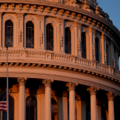Article Reading Time:
2 minutes.

The Paraguayan Senate adopted a document establishing a tax and regulatory framework for miners and companies operating in the cryptocurrency sector.
Paraguayan Congressman Carlos Rejala and Senator Fernando Silva Facetti addressed
to the country's parliament with an initiative to legislatively regulate mining and trading in cryptocurrencies.
Last week all were completedpreliminary approvals and amendments made. As a result, the Senate of Paraguay approved the legal act and submitted the bill to the president of the country for signature.
The new law provides control functions forcrypto industry and supervision of virtual service providers Ministry of Industry and Trade of Paraguay. The agency will have the right to punish individuals or legal entities engaged in mining or providing cryptocurrency services without appropriate permission.
Separate anti-money laundering agencymoney will control the entire investment process carried out by cryptocurrency companies, and the National Securities Commission will be responsible for the commercialization of the resulting assets. Companies associated with investments in cryptocurrency assets will receive the right to operate in the securities system and will be exempt from paying value added taxes.
The law obliges private miners andcorporate mining companies request permission for industrial electricity consumption before applying for a license. The National Energy Directorate (ANDE) will monitor the amount of electricity miners consume. At the same time, companies and citizens mining cryptocurrency will be required to interact with energy workers and submit an energy consumption plan to ANDE in order to avoid the threat of disruptions in energy supplies to social and industrial facilities.
In June, Panamanian President Laurentino Cortizo partially vetoed a cryptocurrency law due to concerns about money laundering issues.



